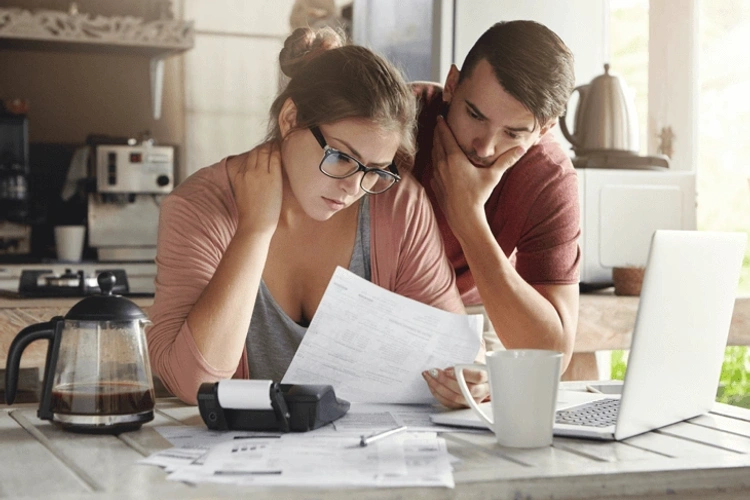1. Don’t ignore the problem
When you’re having financial issues it can be easy to stick your head in the sand and ignore what’s happening until it all blows over. This isn’t the smartest option, as unfortunately, finances need to be constantly looked after and the issue won’t just go away. The sooner you can face up to it, the sooner you can start to sort it out. Being proactive when you hit hard times can help you in the long run.
2. Speak to your lender
Don’t see your lender as the enemy if you’ve found yourself struggling to meet your loan repayments. Speaking to your lender should be the first course of action once you realise you’re struggling.
Your lender will be used to dealing with situations like this and may offer you some help until you’re back on track. Options can range from a payment break (where you delay loan repayments for a few months) to reduced payments or another arrangement.
3. Prioritise your debts
You should look at all of your personal debts and review which are of a higher priority to pay than others. This could mean debts such as your mortgage or a secured loan where the consequences could mean your home being at risk. It’s then best to tackle debts with the highest interest or those that are costing you the most.
List out your debts and work out if you can pay them all off, perhaps by lowering the payments on some, and if you can’t work on the higher priority debts first.
You could also consider a debt consolidation loan to make paying off the debt easier.
4. Work out a budget and a financial plan
A key step to help you get your finances under control, especially if you are going through a time of struggle, is to work out a budget or financial plan and stick to it. Starting from the amount of money you have coming in, work out what you need for food, bills, and other essentials like transport and then work towards paying off your debts with the remainder.
5. Seek professional advice
There are multiple organisations, charities and services out there that can offer you professional advice to help you get a handle on your debts and overall finances. Charities such as Citizens Advice Bureau, StepChange and the Debt Advice Foundation can give you professional, impartial advice.
6. Consider a debt management plan
If you are unable to work out an agreement with your lender, you could explore the possibility of a debt management plan. This is an agreement between you and your creditors directly or through a debt management company, which will help you get your debt to a manageable level.
Things to know about this option are:
- You’ll be able to repay your debts off at a more affordable rate.
- Whoever you take your DMP out with will liaise with your credit issuers to make sure a deal’s made that you can afford to keep up with - now and in the future.
- You no longer make payments to your credit issuers, instead, you make them directly to your DMP provider.
It’s important to note that an agreement like this will stay on your credit file for six years and can often take a long time to complete. It will also require strict budgeting, but a debt management company will help sort out an arrangement that is manageable for you.
I can’t afford a secured loan, what will happen?
If you’re unable to fulfill the repayments of your secured loan, in the first instance you will incur whatever late fees and charges apply. Continuing to miss the payments will then become more serious as it could lead to a default, which will have a negative impact on your credit score.
If things do get serious, the lender can look to reclaim the money owed by using the equity in your home and in the worst-case scenario, your home could be repossessed. If you’re struggling with repaying your secured loan, it’s important you take the necessary steps to stay on track straight away.
I can’t afford my personal loan, what will happen?
If you can’t afford your personal loan payments and therefore don’t make a scheduled repayment, a similar situation will play out. Firstly, you’ll receive whatever late charges and fees apply. If you miss several repayments, this will turn into a default, which will severely hinder your credit score. After this, the lender can take further action to reclaim the money owed, including a CCJ and debt collectors.
It’s best to speak to your lender as soon as possible. Nobody wants to go down the route above, so it’s likely they will try and help you sort out an alternative plan.
Will my credit score be affected?
Missing payments does affect your credit score, and if you miss multiple you could receive a default of a CCJ, which will have a severe impact on your score and can hinder your ability to get credit in the future. Missing the odd payment should be easy to repair in the next few months, but a default or CCJ will stay on your file for six years (though the impact will lessen over time).
Could I lose my belongings?
It depends on the type of loan you have. A secured loan is secured against a physical item such as property or a car or similar. If you fail to make repayments on this type of loan your lender can repossess this item to recoup the costs.
For an unsecured personal loan, the lender doesn’t have a claim over your home like they do with a secured loan. If, however, you fail to make repayments to the extent that they refer you to a collections agency, this agency may seek your possessions in lieu of financial repayments or an attachment of earnings order.
What are my other options?
If you can't afford your loan payments and you've exhausted all your options, seek professional advice on what you should do next as there are multiple options available to you.
Consider a debt consolidation loan to help you get control of your finances if you can't make all your repayments. If the situation is merely temporary, a break from your repayments may be the best course of action.
Disclaimer: We make every effort to ensure content is correct when published. Information on this website doesn't constitute financial advice, and we aren't responsible for the content of any external sites.




